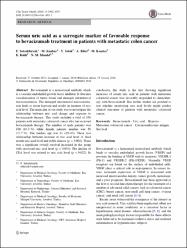| dc.contributor.author | Selçukbiricik, Fatih | |
| dc.contributor.author | Kanbay, Mehmet | |
| dc.contributor.author | Solak, Yalçın | |
| dc.contributor.author | Bilici, Ahmet | |
| dc.contributor.author | Kanıtez, Metin | |
| dc.contributor.author | Balık, Emre | |
| dc.contributor.author | Mandel, Nil Molinas | |
| dc.date.accessioned | 10.07.201910:49:13 | |
| dc.date.accessioned | 2019-07-10T19:51:27Z | |
| dc.date.available | 10.07.201910:49:13 | |
| dc.date.available | 2019-07-10T19:51:27Z | |
| dc.date.issued | 2016 | en_US |
| dc.identifier.citation | Selçukbiricik, F., Kanbay, M., Solak, Y., Bilici, A., Kanıtez, M., Balık, E. ... Mandel, N. M. (2016). Serum uric acid as a surrogate marker of favorable response to bevacizumab treatment in patients with metastatic colon cancer. Clinical & Translational Oncology, 18(11), 1082-1087. https://dx.doi.org/10.1007/s12094-016-1485-1 | en_US |
| dc.identifier.issn | 1699-048X | |
| dc.identifier.issn | 1699-3055 | |
| dc.identifier.uri | https://dx.doi.org/10.1007/s12094-016-1485-1 | |
| dc.identifier.uri | https://hdl.handle.net/20.500.12511/2218 | |
| dc.description | WOS: 000385182500005 | en_US |
| dc.description | PubMed ID: 26781472 | en_US |
| dc.description.abstract | Bevacizumab is a monoclonal antibody which is a vascular endothelial growth factor inhibitor. It obscures vascularization of tumor tissue and damages intratumoral microcirculation. The damaged intratumoral microcirculation leads to tissue hypoxia and results in increase of uric acid level. The main aim of our study was to investigate the relationship between uric acid change and response to bevacizumab therapy. This study included a total of 158 patients with metastatic colorectal cancer who had received bevacizumab therapy. The number of male patients was 100 (63.3 %) while female patients number was 58 (37.7 %). The median age was 61 (29-83). There was relationship between increase of uric acid level of third month uric acid level and stable disease (p < 0.001). There was a significant overall survival increased in the group with increased uric acid level (p < 0.001). The decline of CEA level was related to uric acid level (p < 0.022). In conclusion, this study is the first showing significant increases of serum uric acid in patients with metastatic colorectal cancer who favorably responded to chemotherapy with bevacizumab. But further studies are justified to test whether monitoring uric acid levels might predict clinical outcomes of patients with metastatic colorectal cancer. | en_US |
| dc.language.iso | eng | en_US |
| dc.publisher | Springer | en_US |
| dc.rights | info:eu-repo/semantics/openAccess | en_US |
| dc.subject | Bevacizumab | en_US |
| dc.subject | Uric Acid | en_US |
| dc.subject | Hypoxia | en_US |
| dc.subject | Metastatic Colorectal Cancer | en_US |
| dc.subject | Carcinoembryonic Antigen | en_US |
| dc.subject | Survival | en_US |
| dc.title | Serum uric acid as a surrogate marker of favorable response to bevacizumab treatment in patients with metastatic colon cancer | en_US |
| dc.type | article | en_US |
| dc.relation.ispartof | Clinical & Translational Oncology | en_US |
| dc.department | İstanbul Medipol Üniversitesi, Tıp Fakültesi, Dahili Tıp Bilimleri Bölümü, İç Hastalıkları Ana Bilim Dalı | en_US |
| dc.identifier.volume | 18 | en_US |
| dc.identifier.issue | 11 | en_US |
| dc.identifier.startpage | 1082 | en_US |
| dc.identifier.endpage | 1087 | en_US |
| dc.relation.publicationcategory | Makale - Uluslararası Hakemli Dergi - Kurum Öğretim Elemanı | en_US |
| dc.identifier.doi | 10.1007/s12094-016-1485-1 | en_US |
| dc.identifier.wosquality | Q3 | en_US |
| dc.identifier.scopusquality | Q2 | en_US |


















